On 23 and 24 September, the Federation of European Publishers, in cooperation with the German Publishers and Booksellers Association, organised an Aldus event “Young Publishing Professionals in Brussels”, a training and networking initiative aimed at young people working in publishing houses from all over Europe. The event, organised in the framework of the Aldus project, represented for the participants an opportunity to engage with both the Federation of European Publishers and the EU Institutions, to be involved in the overall European idea and the upholding of the publishing industry values at EU level, to network and benchmark with colleagues from different countries and to be introduced to policy and advocacy work in the sector. 18 young publishers from 11 European countries took part in the first edition of this initiative.
The programme opened on 23 September at the Permanent Representation of the State of Hessen to the EU. Dr. Parinas Parhisi, Head of Higher Education, Research and the Arts at the Representation, welcomed the participants and introduced the institution, the Representation’s working methods, the way they interact with the EU Institutions and their main tasks.
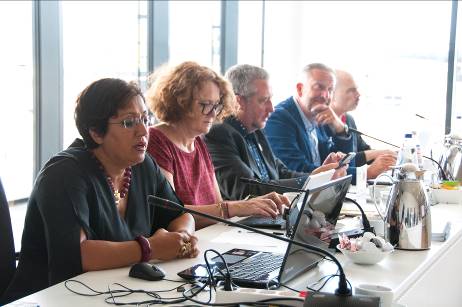
It was then the turn of Rudy Vanschoonbeek, President of FEP, to welcome the participants and introduce them to the work of the Federation. Mr Vanschoonbeek opened his speech highlighting the role of publishers as helping authors to find readers and ultimately improving people’s lives, stressing the need for a favourable environment for this to happen. He concentrated on the necessity for publishers to be represented at EU level, because without the right regulatory and legislative environment, publishers would encounter critical obstacles in their job. Therefore, national publisher associations and FEP work hard to ensure that the policy debate takes into account the concerns of the publishing sector.
Mr Vanschoonbeek listed several policy areas that are very relevant to the work of publishers and the nurturing of a favourable environment for the sector, starting with taxation. He expressed great satisfaction with the role played by FEP in making it possible for EU countries to lower the VAT rate on ebooks: having reduced rates for ebooks and printed books alike helps with sales of books in all formats, which is good not just for publishers but for society in general, as this in turn increases literacy, an aim towards which there is a constant struggle in many countries. Another key topic for FEP is of course copyright: the right that protects the creative work of authors and the investments of publishers in these works, the right which allows publishers to continue searching for new talents, taking risks with publications, and fostering cultural diversity. Mr Vanschoonbeek explained that the digital revolution had brought copyright – previously a topic for specialists – into the spotlight, with opinions on it multiplying and with calls for its “modernisation” often dictated by misguided views that digital content should be usable without permission, for free, usually coming from people who do not see the value in the professional mediation provided by publishers.
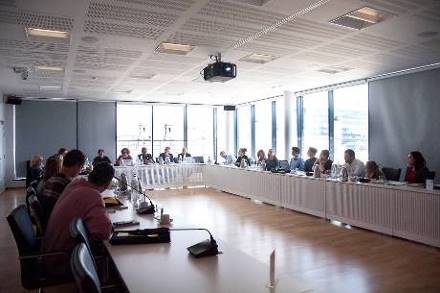
An exercise of modernisation of copyright was undertaken by the European Commission led by President Juncker, one of whose priorities was harmonising the digital single market and increasing access to content while encouraging a fair remuneration for authors. The digital revolution had seen the emergence in the copyright debate of the new – and very loud – voice of the internet platforms, the tech giants that – as Mr Vanschoonbeek reasoned – don’t invest in creation but disseminate content to millions of users giving the illusion of free use by offering access to the creative works of others in exchange for advertising revenues.
The FEP President outlined the principal elements of said reform, commonly known as the Directive on Copyright in the Digital Single Market, illustrating the main provisions affecting publishers. The Directive also includes two provisions that seek to rebalance the relation between internet giants and creative industries, by strengthening the position of news publishers when platforms reuse their content, and by making platforms more responsible for the content uploaded by their users, so as to incentivise the negotiating of licences with rightholders or the removal of illegally distributed content. Against this background, Mr Vanschoonbeek explained, European publishers had decided to support the reform and had campaigned for a fair copyright with the slogan “Stand Up for Culture”. Despite a fierce pushback by the internet giants, supported by their vast financial means, the copyright reform was adopted by the EU, which could be considered, to a certain extent, a victory for the creative sectors.
The session ended with the FEP office illustrating how the Federation communicates with its target audience to explain to them the impact of policies on the book sector and how the sector is organised, emphasising the fact that what publishers do is much more than just printing and delivering books to bookshops; this constant effort is in fact a core mission of FEP. There are still many misperceptions about what publishing is; FEP therefore organises events to explain publishing to politicians, and also to explain policies to publishers.
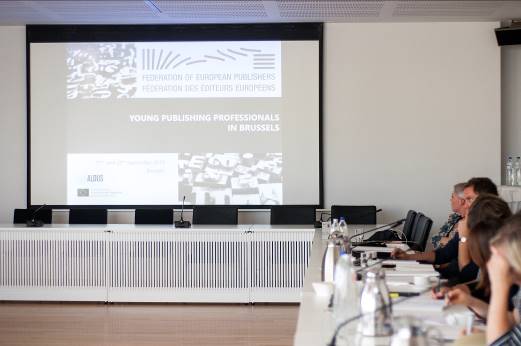
The participants exchanged views and experiences on how to change the perception of publishing: many underlined aspects such as reaching out to young people, highlighting the role of content, using social media, exploring the potential of artificial intelligence, leveraging on the human angle.
The day continued with a presentation by the Copyright Unit of the European Commission’s Directorate‑General for Communications Networks, Content and Technology. A representative of the unit explained that the DG was the main responsible for the digital policies of the EU, with other units dealing with issues like fake news, media policies, different aspects of intellectual property rights policy and so on. The Commission had an ambitious agenda with regard to copyright, added the speaker, and the major reform of the EU rules, adopted after a long negotiation, comprises many elements of significance for the publishing sector, as already underlined by the President of FEP.
The Commission official started with an overview on copyright, stressing that copyright is meant to reward creativity and investment and providing some data on the economic importance of the copyright-intensive industries in Europe, which are a very relevant source of jobs and growth. This was followed by an outline of the EU copyright rules: 13 Directives and Regulations have been adopted over the last 20 years, with the stated objective to define and harmonise rights and provide easier rules to conclude copyright agreements. In this framework, a Regulation on the Portability of Digital Content, a Directive and a Regulation implementing the Marrakesh Treaty providing better access to books to blind and visually impaired people, a Directive reviewing the EU rules on copyright licensing for TV and radio broadcasting by satellite and cable, and the Directive on Copyright in the DSM.
Several FEP members present took the opportunity to raise a few questions to the Commission regarding the implementation of the copyright reform in the Member States and the risks related to possible interpretations of certain aspects of the legislation. It was an opportunity for the young publishers to touch with hand the way advocacy works at EU level and to get a feeling of the technical level that often characterises the discussions.
The day was concluded by a dinner, in which the participants had the possibility to further network among themselves as well as get to know better the office and Board of FEP.
The second day – 24 September – started with a guided visit to the House of European History, a museum about transnational phenomena which have shaped the European continent that aims to connect and compare shared experiences and their diverse interpretations by reading history from a European perspective.
This was followed by the admission of the group into the European Parliament, where they first attended a meeting of the Culture and Education Committee, being publicly welcomed at the beginning of the open session by MEP Romeo Franz (Greens/EFA, Germany). The first item on the agenda was an exchange of views on multilingualism in the EU, marking the European Day of Languages, which is celebrated across Europe on the 26th of September every year.
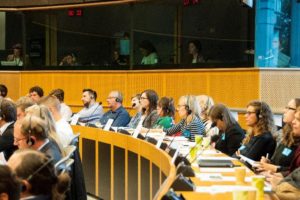
The young publishers had then a meeting with MEP Christian Ehler (EPP, Germany), who provided them valuable insights on the work of the European parliament and of an MEP, also offering suggestions on how stakeholders such as publishers can contribute input to the legislative process. Dr. Ehler also touched upon the EU funding programmes – he was rapporteur on one of the files related to the Horizon Europe programme in the Industry, Research and Energy Committee of the EP – and the ways they can benefit the cultural and creative industries.
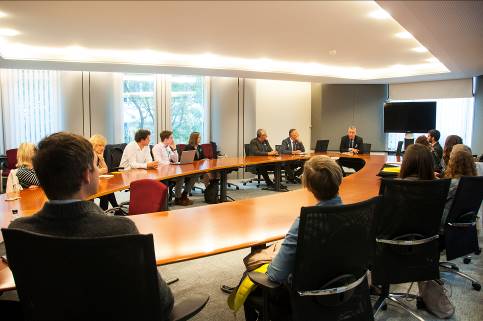
Also at the European Parliament, the participants met with Marc Sundermann, Head of the Brussels Liaison Office and Senior Vice President for Government Relations at media group Bertelsmann. Mr Sundermann gave the young publishers further insights about the work of a lobbyist for the publishing sector at EU level. After that, they were taken on a guided tour of the European Parliament.
The following meeting was with the Managing Director of EU40, a platform of young Pro-European Members of the European Parliament and of the EU national parliaments, whose mission is to serve young Members under the age of 40 and strengthen their role inside the European Parliament. The young publishers received insights about the interests and attitudes of the young MEPs, who look especially at topics related to the environment, freedom of expression, democracy, fake news, and all things digital.
Finally, the participants attended a special Welcome Reception for Members of the new European Parliament, hosted by the European Internet Forum, a think tank of the EP of which FEP is a member. The event was the occasion to present and discuss ‘The Top 10 Digital Future Trends that will shape Europe’s Future and demand Political Leadership’, identified by the EIF:defence of democracy, emerging technologies, data, data privacy and security, anti-trust policy, very high capacity connectivity, online harm, future of work / social stability, taxation and digital leadership Roberto Viola, Director General of DG CNECT in the European Commission, and Jim Cloos, Deputy Director-General for General and Institutional Policy at the General Secretariat of the Council of the EU, made a series of comments on the Digital Trends, and MEPs and other participants engaged in an open discussion.
The day ended again with a dinner, during which the young publishers had the opportunity to exchange views with representatives of the Creative Europe Unit of DG Education and Culture of the European Commission and with MEP Niklas Nienass (Greens/EFA, Germany). The Commission officials focused on the support offered to the creative sectors via the Creative Europe programme, and in particular of the opportunities for the publishing sector: the existing translation grants scheme and the upcoming dedicated book strand of Creative Europe (to be launched in 2021). MEP Nienass spoke about the importance and value of books and culture and the need for more funding for creativity.
 By
By 

















